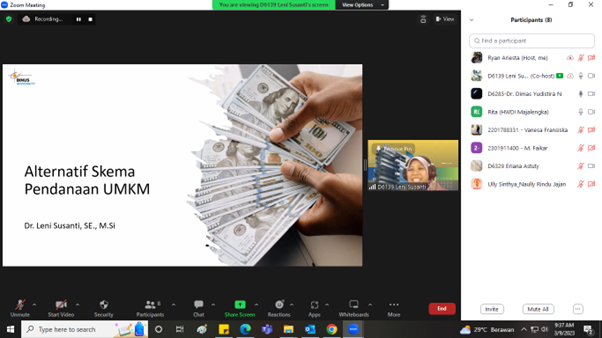Alternative MSME Funding Scheme

MSMEs (Micro, Small, and Medium Enterprises) in Indonesia have shown a positive trend, with their numbers increasing every year. This growth trend has a positive impact on the Indonesian economy. According to data from the Ministry of Cooperatives and SMEs, MSMEs contribute 60.5% to the National GDP. This indicates that MSMEs in Indonesia have the potential to be further developed and contribute more to the economy. To help MSME entrepreneurs, a faculty member of BINUS University @Bandung held a community service initiative.
The purpose of the community service was to address the difficulties that MSME entrepreneurs face in expanding their businesses due to the lack of funding. One of the main reasons for MSME business failures is the lack of funds. Entrepreneurs often don’t know where and when they can seek additional funds.
To solve this problem, Dr. Leni Susanti, SE., M.Si, a Creativepreneurship Lecturer at Binus Bandung Campus, conducted an online workshop on March 9, 2023, which was attended by MSME entrepreneurs. She explained that the type of funding available for MSMEs depends on the type of business. Most entrepreneurs are not aware of this and often look for funding in the wrong places at the wrong time, mainly because they don’t understand how investors and banks think.
Dr. Susanti emphasized that access to capital for MSMEs is not only in the form of loans from banks; there are other sources of funding that MSME entrepreneurs need to know about, including non-commercial, semi-commercial and commercial funding sources. She explained that access to capital can also be seen from the agreement scheme. There are schemes in the form of social assistance capital, such as pure grants without conditions and grants with conditions. There are also schemes in the form of loans such as investment credit, working capital credit, invoice receivables, rent purchase or leasing, and pawning. The equity scheme is access to capital with an agreement scheme where funds from investors do not need to be returned because they have been invested in the company to increase capital (equity) on the company’s balance sheet. Lastly, business funding schemes for MSMEs are project financing or business partnership (syirkah) schemes and franchise schemes.
The implementation of this workshop supports the 11th sustainable development goal (SDG), namely sustainable cities and communities. In particular, the workshop provides knowledge to MSME entrepreneurs to obtain business funding. By knowing the business funding scheme, MSME entrepreneurs can apply for funding at the right time and place, thereby increasing their chances of expanding their businesses.
